Whitehall is a game of hidden movement, set in the age of Jack the Ripper. 1 player acts as an unknown killer traversing London, attempting to evade 1-3 other players playing investigators, taunting them as he goes.
The Hunt Begins
Hidden movement games are a sort of asymmetric battleship, where one player chooses their movements and records them, while the other 1-3 players move their characters with full visibility, and use logic to determine where the hidden player is, or has been.
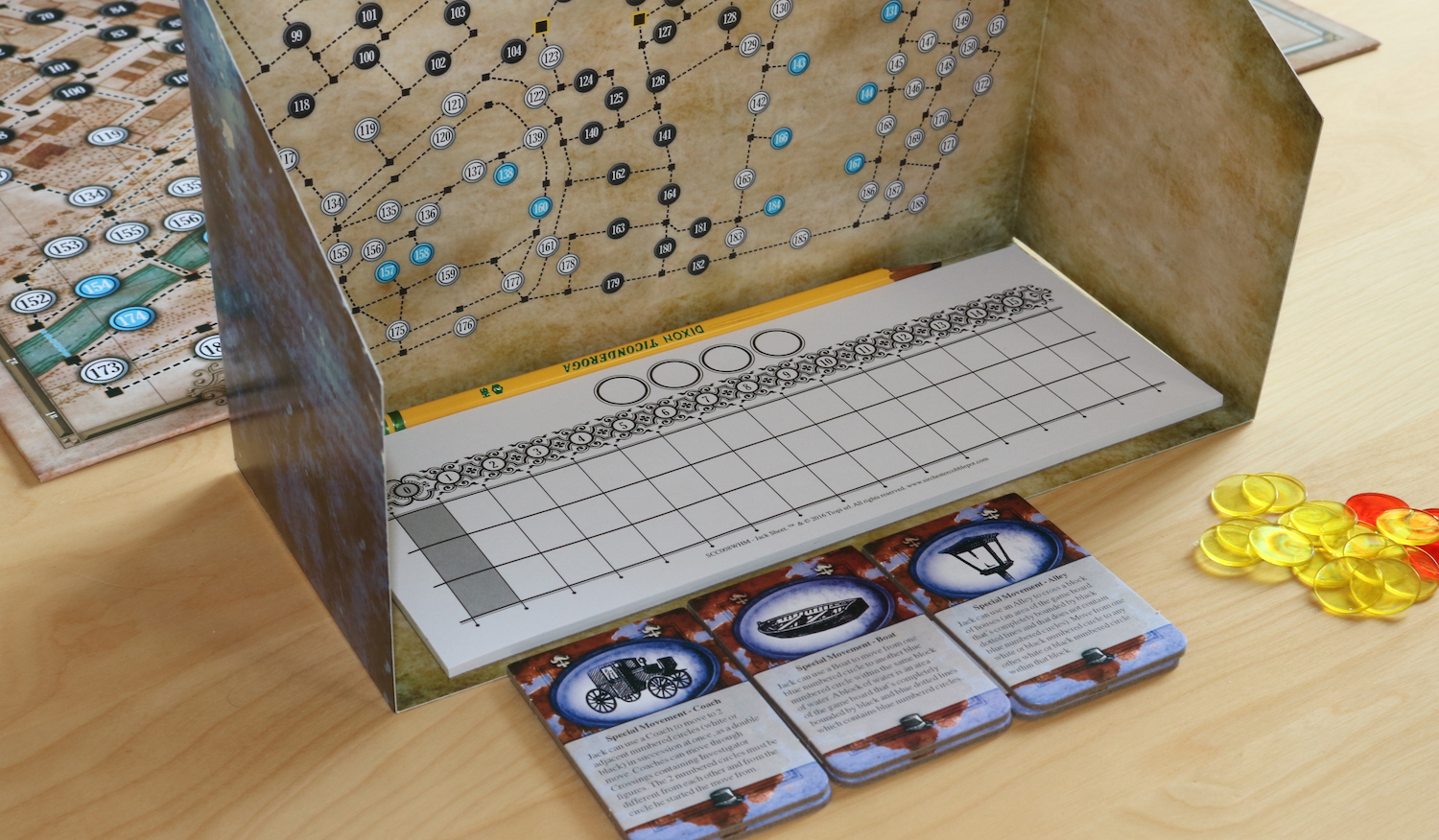
The theme perfectly fits this game!! The whole idea is so great. Whitehall perfectly simulates a cat and mouse chase, and scratches an investigation (or evasion) itch. The murderer (called "Jack"), must reach 4 secret locations (called discovery locations - one in each quadrant of the board) without being arrested by investigators. Jack starts at one of the points (revealed to the investigators at that moment) and has 15 turns to get to any of the remaining locations. If Jack arrives at a discovery location without being arrested, the round ends and that discovery location is revealed. The investigators start in the center of the map on their choice of a few positions. Investigators have different movement properties from Jack, and investigators or Jack may have a movement advantage in different parts of the board. After Jack has moved in a turn, all the investigators move and then each can either investigate locations nearby or make an arrest at a single location. Investigations will reveal whether Jack has ever passed through that location, and are vital in pinning him down. Arrests target a single location and end the game if Jack is hiding in that spot.
Jack has access to special movements that make sense for a killer trying to evade the police in London! There are 3 types of movements, limited to 2 uses each. Jack can use a carriage to move twice in one turn (and move through investigators). Alleys can be used to move through a block of buildings, evading investigators or rapidly moving across the map. Also Jack can take a boat between various water points that the investigators cannot. But, as these tokens are shown to the investigators, they can also reveal your location.
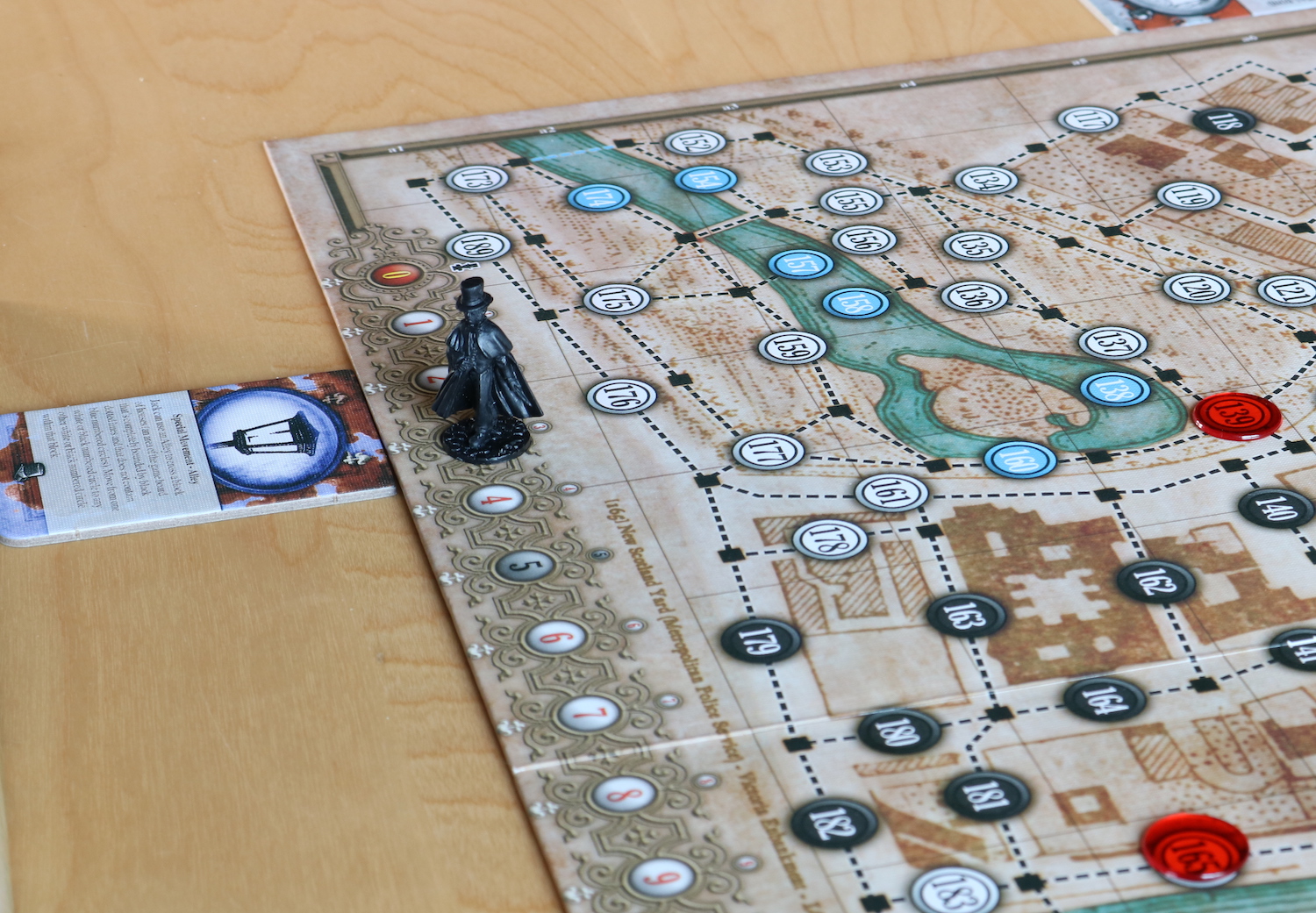
Regarding the game components, there aren't too many of them and they are all well designed to meet their purpose. Setup consists of unfolding the board, unfolding the Jack screen, and pulling out the player and indicator tokens. Some of the investigators seem to stand at a bit of angle but it doesn't affect their utility at all. The board has a nice weight, the Jack move-recording papers would be easily duplicated if you forgot to make more before running out, and Jack's screen really does stand up nicely on its own and shield his eyes and paper from view well. On the backside of the screen is a map for Jack to use, but one downside is that Jack has no way to mark on his map the current position of the investigators; the rulebook suggests that the Jack player keep his/her eyes averted from the main board to avoid giving inadvertent hints, but since there isn't a mark on the standup board about where the investigators are, it's hard to move Jack without referencing the main board. This idea would probably increase production costs a lot, but a possible solution might be a magnetic standup board with little magnets for the investigators? This flaw doesn't break the game, but is an area that could be improved.
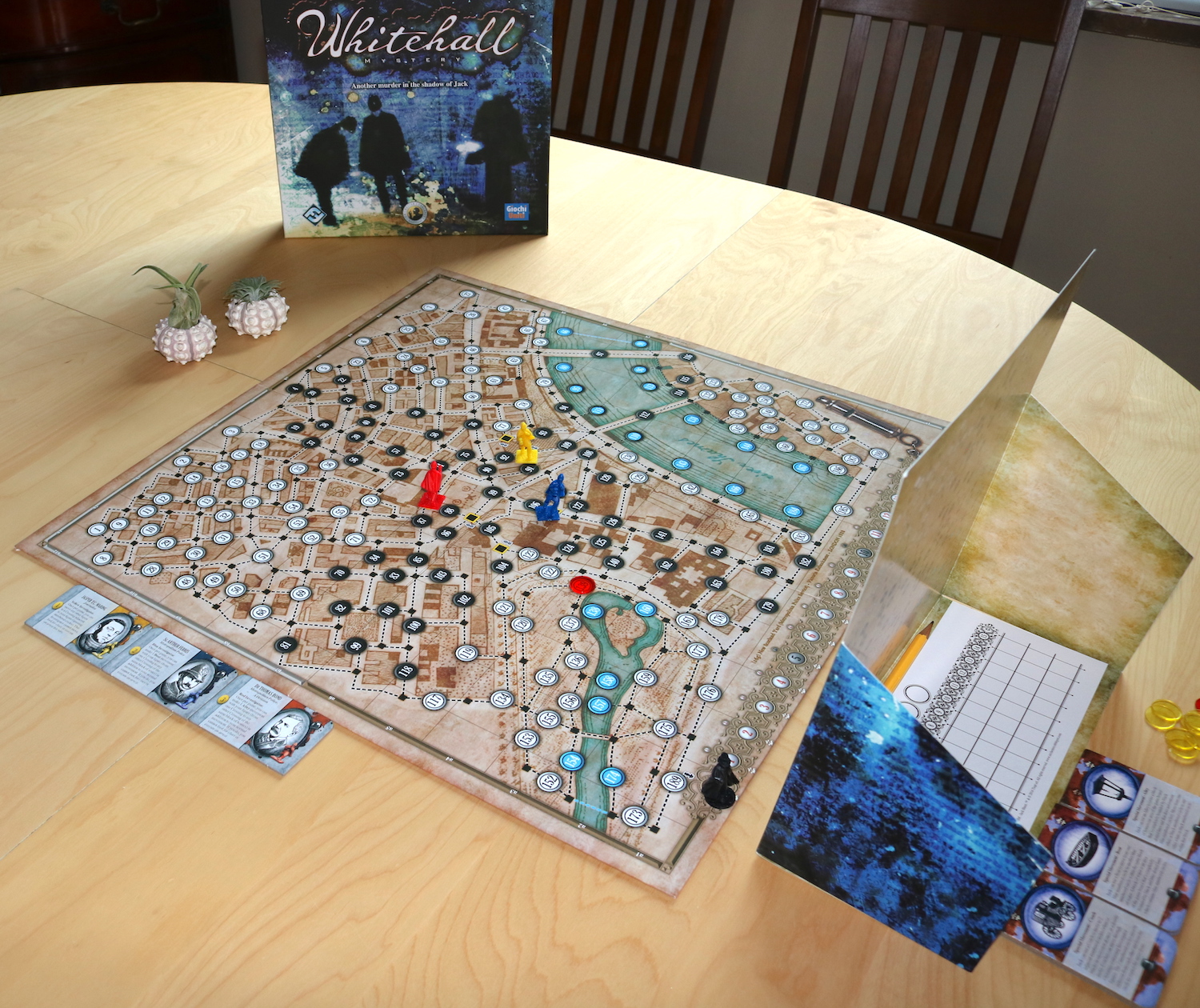
The manual does a great job of explaining the various rules, as well as providing a lot of flavor and story text. If your group likes reading about grisly murders, read them. If they don't, definitely ignore those parts. It also contains a couple of ways to modify the game to aid either Jack or the investigators. These include allowing the investigators to utilize some unique powers, or for Jack to use his special movement tokens without revealing which token it is.
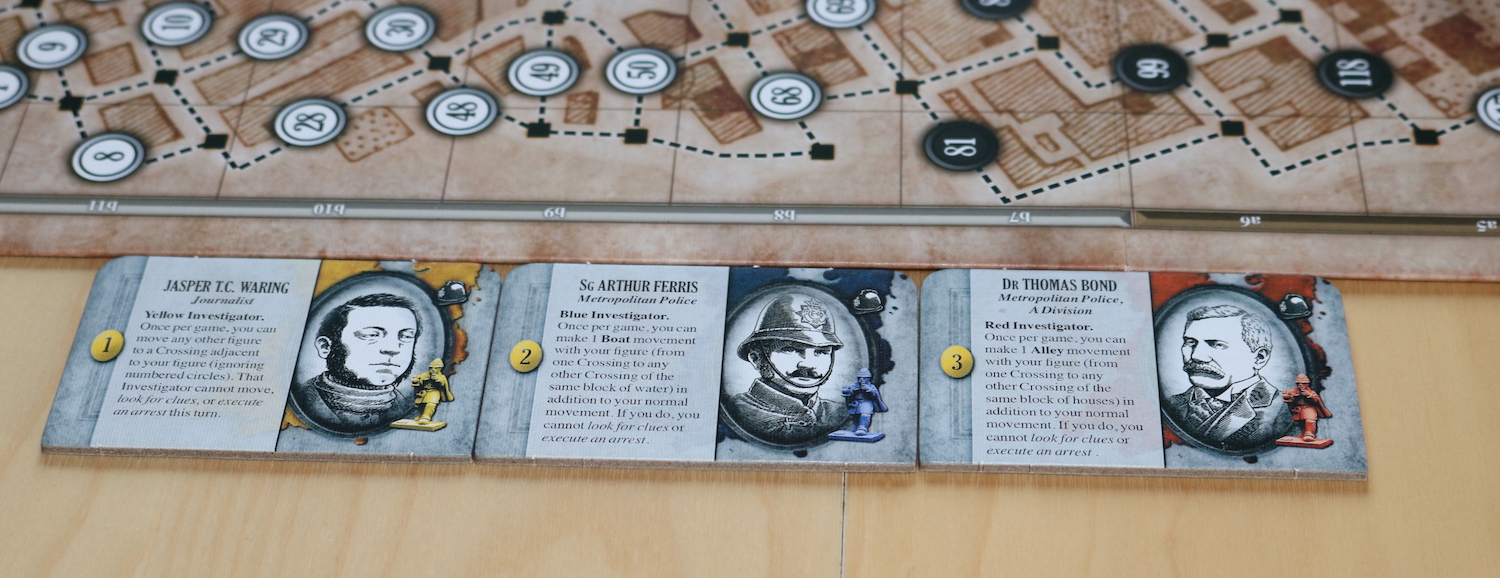
Tracking
It is interesting to compare 2 and 4 player Whitehall. With 2 players, it's a head to head battle of wits (with a small enough table, literally as well as figuratively). Controlling all the investigators alone can be daunting; the map has so many twists and turns that it's easy to miss a movement or investigation option at a glance, and having another set of eyes helps. Talking through the moves and options also can be useful. However, with 1 person controlling the whole investigation, there isn't any chatter for Jack to overhear, and the strategy of the investigators remains a little more opaque. Trying to decide which setup suits the game better is an interesting dilemma and Toasted Cardboard hasn't reached a final decision yet - it probably depends on the personality of the players.
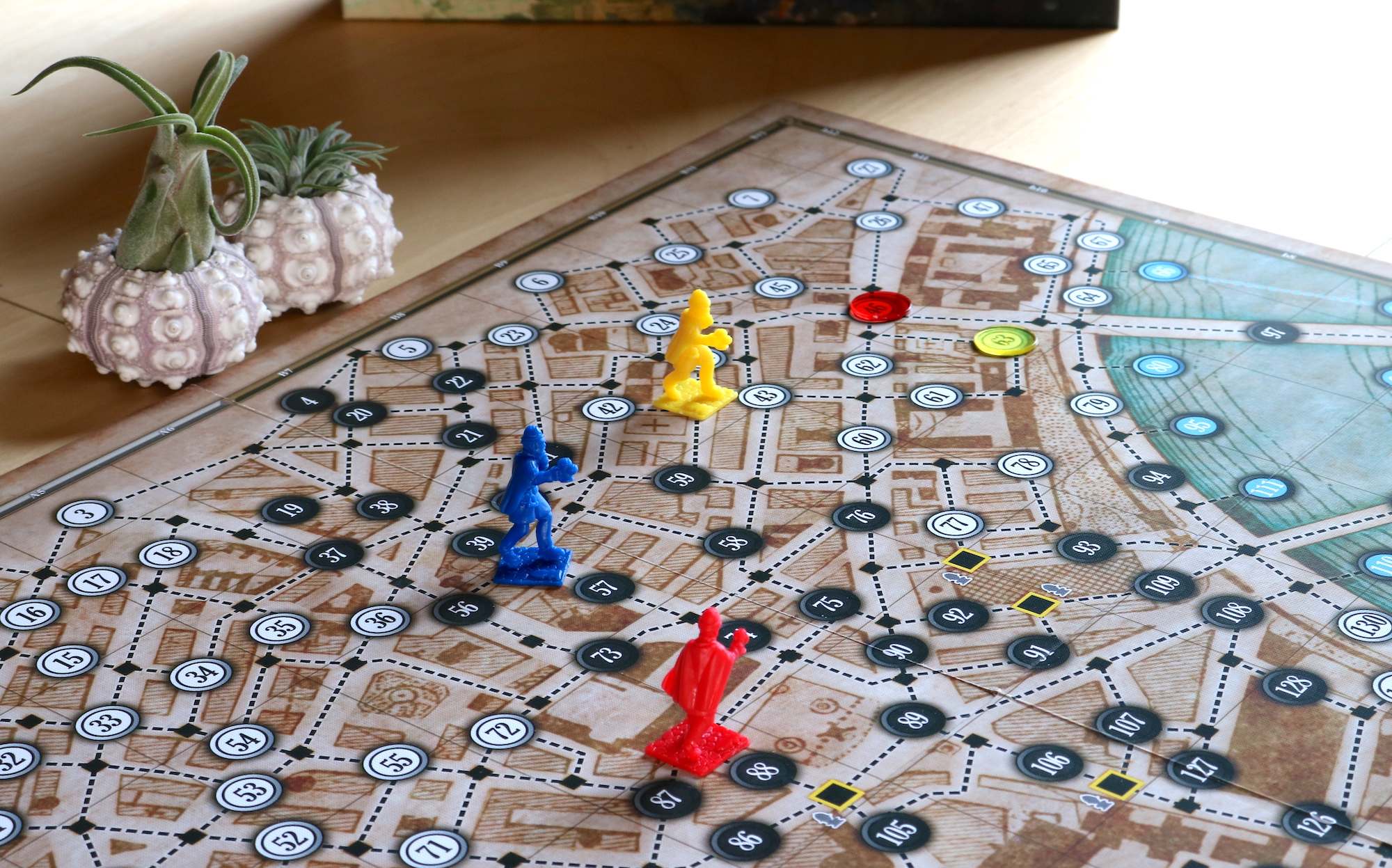
Something we consider a flaw in Whitehall is its lack of defense against quarterbacking when there are > 2 players. Because all the investigators are working together and discussing strategy, it is easy for 1-2 more intense, experienced, or vocal players to tell the others where to move and what actions to perform. It's self explanatory but this can lead to boredom for less involved players.
A second flaw is the temptation to overanalyze each move. With 3 investigators (2 of whom were on their first playthrough), the game ultimately took about 3 hours, instead of the 1 hour advertised, because of the sheer amount of thought being put in each turn. It made for a very intense game, with a maximally climactic ending in which the investigators arrested Jack on the same turn that he arrived at his final discovery location prior to winning. In addition to tripling the time commitment, this also meant the Jack player had a lot more downtime (suggested use for this time - make conversation with any investigators being quarterbacked out of conversation!), which wasn't ideal. While we haven't tried this, if your group wants to play this game but is not interested in a 3 hour marathon of wills, consider a timer for planning each move - maybe 2 minutes for the Jack player and 5 minutes for the investigators would be appropriate? This isn't necessary if an intense 3 hour mind-game sounds like what you want, but something to consider if you're looking for a more casual experience.
The Final Arrest
While this style of game has its flaws, the conversations that emerge at the end of the game, and how you keep thinking about what moves you could have done differently hours after you finished playing, make this an exciting addition to any board game collection. The pace of the game and variable engagement of investigators can be a problem, but a few simple house rules can remedy this if it's a problem. The simple-to-teach rules combined with strategic depth allow you to play with hardcore gamers or casual friends and family. We highly recommend Whitehall Mystery for players who are interested in a hidden movement game.
Mood Music
As many people will know, Melodice has playlists of YouTube videos selected for various boardgames. There is one for Whitehall, but it was extremely dark, and almost too atmospheric–while it fit the theme of the game, this was ultimately a game night between friends, and not an actual murder investigation. We actually switched to the playlist for Sherlock Holmes: Consulting Detective, and felt it suit the mood of the group and the game much better! It added an extra level of intensity without being too creepy.
